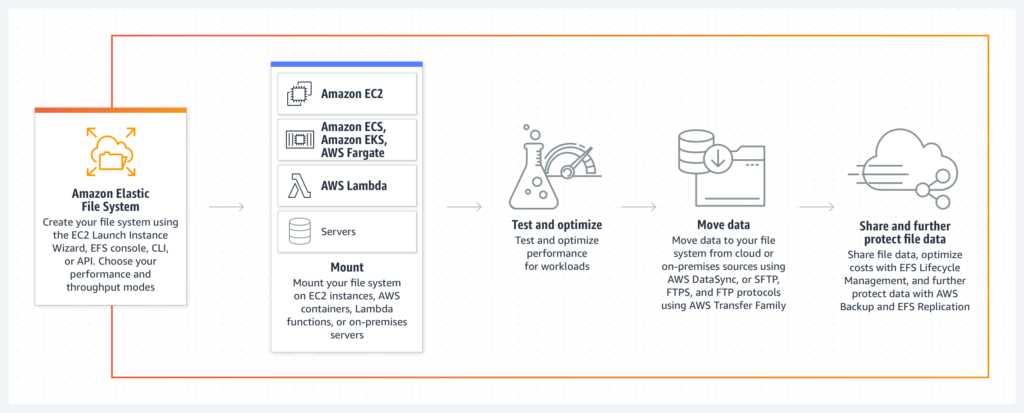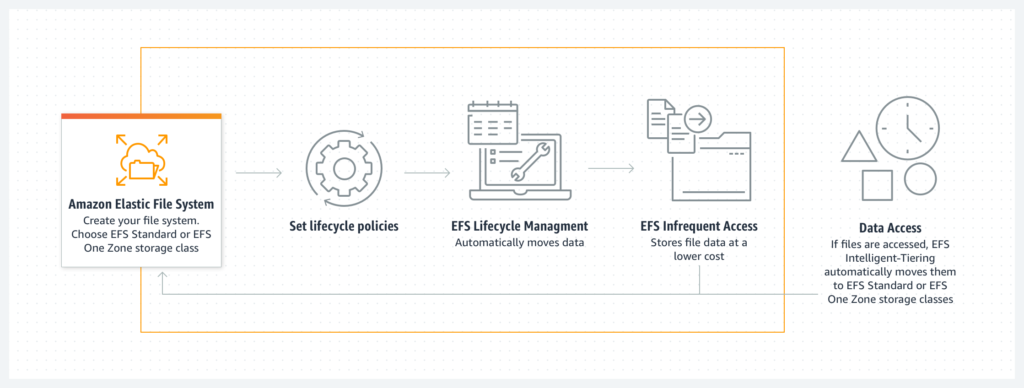As a leading cloud consulting firm, we understand that robust and scalable data storage is pivotal for driving business success. Today, we would like to introduce you to the capabilities of Amazon Elastic File System (EFS) and how it can propel your business forward. EFS not only facilitates effortless data storage scalability but also enhances performance and cost-effectiveness, providing the agility your business needs to thrive in today’s competitive market.
EFS in a Brief
Imagine a storage system that adapts to your needs, effortlessly growing to petabytes on demand. No more scrambling for extra space or waiting for slow backups – EFS takes care of it all. But EFS isn’t just about size; it’s about blazing-fast performance. Think lightning-quick throughput and near-instantaneous access for demanding workloads like streaming video or big data processing. Your applications will never be held back by sluggish storage again. And the best part? EFS is fully managed. That means no more headaches with provisioning, patching, or maintenance. EFS handles it all behind the scenes, freeing you to focus on what truly matters – your business.

EFS Key Features
Effortless Management
Amazon EFS shines in its fully managed nature, supporting Network File System (NFS v4.0 and v4.1) and delivering shared file system storage for Linux workloads. Eliminating the need for managing file servers, hardware updates, or backups, Amazon EFS streamlines file system creation and configuration, allowing a focus on applications rather than infrastructure.
With elasticity taking center stage, Amazon EFS enables automatic scaling of file system storage and throughput capacity. This eliminates the need for manual provisioning, ensuring seamless scaling to petabytes of storage, hundreds of thousands of IOPS, and tens of gigabytes per second of throughput, aligning with evolving workloads.
Resilience and Availability
Tailoring to different durability and availability needs, Amazon EFS offers Regional file systems, optimizing durability with data stored across multiple Availability Zones (AZs). Meanwhile, EFS One Zone file systems provide a cost-effective solution with slightly less durability. Boasting 99.999999999% (11 nines) durability over a year, Amazon EFS ensures data availability with AZ-specific EFS mount targets.
Versatile Storage Classes and Security Measures
Amazon EFS simplifies storage management by introducing three distinct storage classes, each tailored to specific access patterns and cost considerations. EFS Standard, fueled by SSD, excels in delivering high performance for frequently accessed data. On the other hand, EFS Infrequent Access (IA) and EFS Archive provide cost-optimized solutions catering to infrequently accessed data, adding a layer of flexibility to your storage strategy.
Effortless Transition with Automated File Tiering:
AWS EFS streamlines storage efficiency by automatically tiering files between the storage classes based on access patterns. Through EFS Lifecycle Management and Intelligent-Tiering, this process is enhanced, ensuring seamless transitions between EFS Standard, EFS IA, and EFS Archive. Whether guided by custom or default policies, this automated approach facilitates efficient file management, with automatic transitions back to EFS Standard for faster access when needed.

Enhanced Disaster Recovery with EFS Replication:
In scenarios requiring disaster recovery, EFS Replication steps in seamlessly across multiple Availability Zones (AZs), safeguarding data integrity. This feature ensures that your data remains secure and accessible, even in the face of unforeseen challenges.
Centralized Data Protection with AWS Backup:
To further fortify data protection within the Amazon EFS ecosystem, AWS Backup takes care of your back up needs. Centralizing and automating backup policies, AWS Backup simplifies the process of data protection and recovery. This cohesive approach ensures that your data is consistently safeguarded, offering peace of mind in the event of any data-related challenges.
Amazon EFS in Real-World Scenarios
Containerized Applications with Elastic Scalability:
Amazon EFS proves instrumental in supporting containerized applications, especially those deployed on Amazon Elastic Container Service (ECS) or Elastic Kubernetes Service (EKS). With the ability to scale file storage based on containerized workloads, EFS ensures that storage capacity adjusts dynamically to meet the demands of fluctuating container instances. This use case is ideal for businesses seeking an agile and scalable solution for containerized applications, where the dynamic nature of workloads requires a file storage system that can adapt in real-time.
DevOps and Continuous Integration/Continuous Deployment (CI/CD):
For organizations embracing DevOps practices and CI/CD pipelines, Amazon EFS facilitates efficient and collaborative development workflows. Development and testing environments often require shared storage to ensure consistency and collaboration among team members. EFS offers a scalable and fully managed file system, eliminating the need for manual provisioning and maintenance. CI/CD pipelines can benefit from the elasticity of EFS, ensuring that storage scales automatically to accommodate the growing demands of automated testing and deployment processes. This use case is well-suited for organizations looking to streamline their development pipelines and enhance collaboration among development teams.
Big Data Analytics and Data Lakes:
Amazon EFS serves as a robust storage solution for big data analytics, providing the necessary throughput and scalability for processing large datasets. Data lakes, which often store diverse types of data for analytics purposes, can leverage EFS to store and share data across different analytics tools and compute instances. Whether it’s running Apache Spark jobs, processing log files, or conducting machine learning analyses, Amazon EFS ensures that the underlying storage infrastructure scales seamlessly, allowing organizations to focus on deriving insights from their data without worrying about storage limitations.
Media and Entertainment Workflows:
In the realm of media and entertainment, where large files and collaborative workflows are the norm, Amazon EFS stands out as a reliable solution. Content creators and editors can leverage shared file systems to access and collaborate on media assets in real-time. The high throughput and low-latency characteristics of EFS ensure smooth video editing, rendering, and content distribution. Whether it’s a film production team collaborating across different locations or a media agency managing a vast repository of digital assets, Amazon EFS provides the performance and collaboration capabilities needed for seamless content creation.
Embrace the Future of Data Storage
As businesses navigate the cloud landscape, strategically assessing where EFS fits best is crucial. Whether you’re running containerized applications, handling big data analytics, or securing critical backups, EFS emerges as a versatile solution.
Contact Digico Solutions today and let our AWS experts guide you through unlocking the power of data storage for your business. We’ll help you scale effortlessly, boost performance, and gain the agility and efficiency you need to thrive in the data-driven age.










